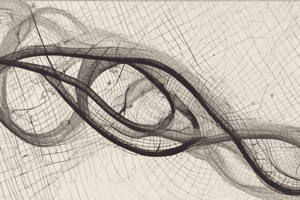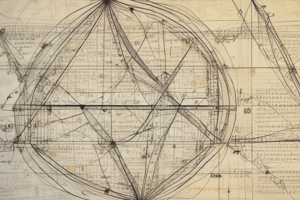Podcast
Questions and Answers
What does the notation n! (read as 'n factorial') represent?
What does the notation n! (read as 'n factorial') represent?
- The product of all positive integers excluding n
- The product of all positive integers up to n (correct)
- The sum of all positive integers up to n
- The product of all positive integers greater than n
What is the value of 0!?
What is the value of 0!?
- 1 (correct)
- undefined
- -1
- 0
What is the total number of possible arrangements of n different objects?
What is the total number of possible arrangements of n different objects?
- n^2
- n^3
- n! (correct)
- 2^n
What is the value of n! / (n-1)! for any positive integer n?
What is the value of n! / (n-1)! for any positive integer n?
How many choices are available for the first place in a 400 m race with 8 athletes?
How many choices are available for the first place in a 400 m race with 8 athletes?
What is the purpose of factorial notation in counting problems?
What is the purpose of factorial notation in counting problems?
What is the number of different ways in which the first three places can be arranged in a 400 m race with 8 athletes?
What is the number of different ways in which the first three places can be arranged in a 400 m race with 8 athletes?
What type of problems frequently use factorial notation?
What type of problems frequently use factorial notation?
What is the number of different ways to arrange the first three places in a competition with 8 contestants?
What is the number of different ways to arrange the first three places in a competition with 8 contestants?
If seven boys must sit in a row, and the youngest and oldest must sit together, how many total arrangements are possible?
If seven boys must sit in a row, and the youngest and oldest must sit together, how many total arrangements are possible?
If seven boys must sit in a row, but the youngest and oldest must not sit together, how many total arrangements are possible?
If seven boys must sit in a row, but the youngest and oldest must not sit together, how many total arrangements are possible?
What is the formula to find the total number of unique arrangements of letters in a word with repeated letters?
What is the formula to find the total number of unique arrangements of letters in a word with repeated letters?
What is the probability of an event in terms of counting principles?
What is the probability of an event in terms of counting principles?
How many arrangements are there for a word with 7 letters, where 2 letters are repeated?
How many arrangements are there for a word with 7 letters, where 2 letters are repeated?
What is the purpose of counting principles in probability?
What is the purpose of counting principles in probability?
How do you simplify an arrangement problem with constraints?
How do you simplify an arrangement problem with constraints?
What is the value of 5! + 4!?
What is the value of 5! + 4!?
How many different ways can 5 books be arranged on a shelf?
How many different ways can 5 books be arranged on a shelf?
If 6 people are attending a dinner party, how many ways can they be seated around a circular table?
If 6 people are attending a dinner party, how many ways can they be seated around a circular table?
What is the value of (\frac{6!}{3!})?
What is the value of (\frac{6!}{3!})?
In a group of 9 students, how many ways can 3 students be chosen to represent the class?
In a group of 9 students, how many ways can 3 students be chosen to represent the class?
What is the value of (\frac{4!}{2!})?
What is the value of (\frac{4!}{2!})?
In a game of chess, there are 16 possible moves for white's pawn. If black responds with one of 15 possible moves, how many different outcomes are possible for the first two moves?
In a game of chess, there are 16 possible moves for white's pawn. If black responds with one of 15 possible moves, how many different outcomes are possible for the first two moves?
A code consists of 5 digits, where each digit can be any of the numbers 0-9. How many possible codes are there?
A code consists of 5 digits, where each digit can be any of the numbers 0-9. How many possible codes are there?
In an arrangement problem with constraints, what is the general strategy to simplify the problem?
In an arrangement problem with constraints, what is the general strategy to simplify the problem?
What is the formula to find the total number of unique arrangements of letters in a word with repeated letters?
What is the formula to find the total number of unique arrangements of letters in a word with repeated letters?
In a probability problem, what is the formula to calculate the probability of an event?
In a probability problem, what is the formula to calculate the probability of an event?
In an arrangement problem, what happens to the number of arrangements when a constraint is applied?
In an arrangement problem, what happens to the number of arrangements when a constraint is applied?
What is the purpose of counting principles in probability?
What is the purpose of counting principles in probability?
How do you calculate the total number of arrangements when some objects must not sit together?
How do you calculate the total number of arrangements when some objects must not sit together?
What is the formula to find the total number of arrangements when some objects are treated as a single entity?
What is the formula to find the total number of arrangements when some objects are treated as a single entity?
What is the purpose of treating constrained elements as a single entity in an arrangement problem?
What is the purpose of treating constrained elements as a single entity in an arrangement problem?
In an arrangement problem with constraints, what happens to the number of arrangements when the constraint is removed?
In an arrangement problem with constraints, what happens to the number of arrangements when the constraint is removed?
What is the probability that a random arrangement of the letters in the word 'BANANA' starts and ends with the letter 'A'?
What is the probability that a random arrangement of the letters in the word 'BANANA' starts and ends with the letter 'A'?
A group of 8 friends want to sit in a row, but 2 friends, Alice and Bob, refuse to sit together. How many arrangements are possible?
A group of 8 friends want to sit in a row, but 2 friends, Alice and Bob, refuse to sit together. How many arrangements are possible?
What is the total number of unique arrangements of the letters in the word 'STATISTICS'?
What is the total number of unique arrangements of the letters in the word 'STATISTICS'?
For a set of 10 different objects, which of the following is NOT a correct way to calculate the total number of possible arrangements?
For a set of 10 different objects, which of the following is NOT a correct way to calculate the total number of possible arrangements?
A code consists of 7 digits, where each digit can be any of the numbers 0-9. How many possible codes are there if the first and last digits must be the same?
A code consists of 7 digits, where each digit can be any of the numbers 0-9. How many possible codes are there if the first and last digits must be the same?
What is the relationship between the number of possible arrangements of n objects and the number of possible arrangements of (n - 1) objects?
What is the relationship between the number of possible arrangements of n objects and the number of possible arrangements of (n - 1) objects?
A group of 12 people are attending a dinner party, and they can be seated in any of the 12 chairs around a circular table. How many possible seating arrangements are there?
A group of 12 people are attending a dinner party, and they can be seated in any of the 12 chairs around a circular table. How many possible seating arrangements are there?
What is the probability that a random arrangement of 7 boys sitting in a row has the youngest and oldest sitting together?
What is the probability that a random arrangement of 7 boys sitting in a row has the youngest and oldest sitting together?
What is the purpose of using factorial notation in counting problems?
What is the purpose of using factorial notation in counting problems?
In how many ways can 7 different books be arranged on a shelf if 2 books are to be placed together?
In how many ways can 7 different books be arranged on a shelf if 2 books are to be placed together?
Five different books are to be arranged on a shelf. How many possible arrangements are there?
Five different books are to be arranged on a shelf. How many possible arrangements are there?
What is the total number of arrangements of 9 people sitting in a row, where 3 friends refuse to sit together?
What is the total number of arrangements of 9 people sitting in a row, where 3 friends refuse to sit together?
Which of the following is a correct application of factorial notation?
Which of the following is a correct application of factorial notation?
A box contains 8 different toys, and 3 of them are to be arranged in a row. How many possible arrangements are there?
A box contains 8 different toys, and 3 of them are to be arranged in a row. How many possible arrangements are there?
What is the value of (\frac{8!}{5!})?
What is the value of (\frac{8!}{5!})?




